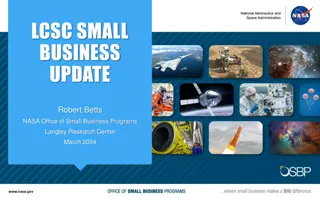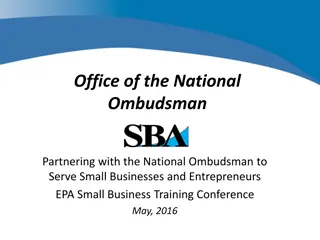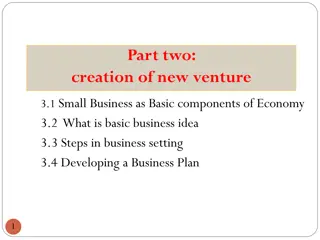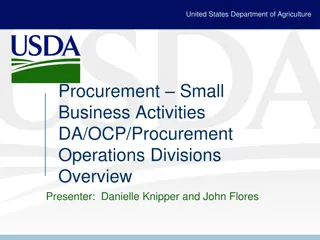Effective Time Management Strategies for Small Businesses
Learn how to prioritize tasks, reduce distractions, and maximize productivity with time management techniques tailored for small businesses. Discover the importance and benefits of efficient time management, create a solid time management plan, and boost your business's success with practical tips and methods.
Download Presentation

Please find below an Image/Link to download the presentation.
The content on the website is provided AS IS for your information and personal use only. It may not be sold, licensed, or shared on other websites without obtaining consent from the author. Download presentation by click this link. If you encounter any issues during the download, it is possible that the publisher has removed the file from their server.
E N D
Presentation Transcript
Time Management FOR A SMALL BUSINESS Updated:09-2016
Welcome 1. Agenda 2. GroundRules 3. Introductions TIMEMANAGEMENT #
Objectives After completing this training, you will be ableto: Explain the concept of time management and why it is important to small businesses Explain some commonly employedtime management practices,including: Paretoanalysis ABC method Eisenhowermethod POSEC method TIMEMANAGEMENT #
What Do YouKnow? What do you know or want to learnabout time management? TIMEMANAGEMENT #
TimeManagement: Systematically prioritizing tasks and competing demands to complete the most important tasks withina certainamountoftime Goal is to reduce distractions so that moretasks and demands arecompleted TIMEMANAGEMENT #
Importance of Time Management for a SmallBusiness Poor time management can cost youmoney Maximize the number of hours in yourworkday Work smarter not harder within the time constraints of a workday TIMEMANAGEMENT #
Benefits of Time Management for a SmallBusiness More business equalsmore income More focused More organized Less stress More time forfamily andfriends TIMEMANAGEMENT #
Discussion Point #1: Benefits of TimeManagement Describe how you could benefitfrom using timemanagement. TIMEMANAGEMENT #
Time ManagementPlan Awritten guide ofprioritized tasks tocomplete on a daily, weekly, and monthly basis that will achieve yourwrittengoals TIMEMANAGEMENT #
Sample Time ManagementPlan GOAL I will generate a minimum of $6,000 insales every month, starting the month after next (March). TIMEMANAGEMENT #
Time Management Plan KeyElements 1. Clearly defined writtengoals 2. Detailed list of tasks 3. Prioritization of thetasks 4. List of important ongoing business functions 5. Built inflexibility TIMEMANAGEMENT #
Key Element1: Clearly Defined WrittenGoals TIMEMANAGEMENT #
Key Element2: Detailed List ofTasks: For eachtask What needs to be done? Who needs to doit? When is itdue? Where is it being done or beingdelivered? Any otherdetails TIMEMANAGEMENT #
Key Element3: Prioritization of theTasks Assign a priority level to every task undereach step Rearrange the tasks in order ofpriority Allocate ample time to complete the most critical tasksfirst TIMEMANAGEMENT #
Key Element 4: List Important Ongoing BusinessFunctions Include in your task list timeto: Pay bills Invoiceclients Reviewcorrespondence Make bankdeposits TIMEMANAGEMENT #
Key Element5: Built-inFlexibility When assigning an estimated amount oftime to complete each task, be sureto: Allow for time to address opportunities and issues as theyarise Allow extra time for critical tasks, ifneeded Allow time forinterruptions Allow time forbreaks TIMEMANAGEMENT #
SMART Goals TIMEMANAGEMENT #
Discussion Point #2: SMARTGoals Write one of your business goalsusing the SMART format. TIMEMANAGEMENT #
Using SMARTGoals Write the steps and tasks toidentify: Who What When Where Why TIMEMANAGEMENT #
Discussion Point #3: Tasks Developed with SMARTGoals Look at the SMART goal you wrote foryour business. Write the steps and tasks needed to achieve yourgoal. TIMEMANAGEMENT #
ParetoAnalysis 20% of tasks or a person s efforts willproduce 80% of theresult Tasks that generate the greatest return should be completedfirst Prioritizing tasks is critically important because smallbusiness owners usually juggle manypriorities TIMEMANAGEMENT #
ABC Method Give mostimportant tasks the letterA Less important tasksthe letterB Least importanttasks the letterC TIMEMANAGEMENT #
EisenhowerMethod TIMEMANAGEMENT #
POSEC Method TIMEMANAGEMENT #
Managing YourTime For the next workweek: Prioritize the list oftasks Allocate ample time to complete each task Don t forget those important ongoing businessfunctions Select a tool for planning your daily andweekly time TIMEMANAGEMENT #
A Closer Look at Allocating Time in YourTime Management Plan Tips for prioritizing yourtasks Know the number of hours in your workday Allocate only 75 percent of the available workhours TIMEMANAGEMENT #
Working YourPlan Tips for prioritizing yourtasks Use timers or alarms to stay ontask Work high priority tasksFIRST Take time to manage yourbusiness Takebreaks Set aside time to prioritize for nextweek TIMEMANAGEMENT #
AssigningTasksand DelegatingRoles and Responsibilities Who else can do one or some of the tasksin this week splan? Am I the only person who can dothis? TIMEMANAGEMENT #
Discussion Point #4: TaskDelegation To whom can you delegatetasks? TIMEMANAGEMENT #
Reviewing and Updating Your Time ManagementPlan TIMEMANAGEMENT #
Common Distractions, Obstacles, andSolutions People In person Bytelephone Meetings E-mail Workenvironment Self-initiateddistractions TIMEMANAGEMENT #
Top Four Key Points toRemember 1. The five key elements of a good time managementplan 2. Use written SMART goals with steps and tasks to create clarity offocus 3. The four ways to prioritize goals for writing your time management plan 4. Update time management plans daily andweekly TIMEMANAGEMENT #
Summary What final questions do youhave? What have youlearned? How would you evaluate thetraining? TIMEMANAGEMENT #
Conclusion You have learnedabout: The concept of time management and why it is important to small businesses Some commonly employed timemanagement practices, including: Pareto analysis, ABC method,Eisenhower method, method and POSEC TIMEMANAGEMENT #























